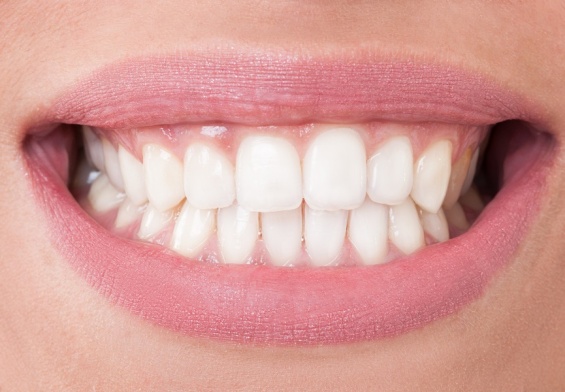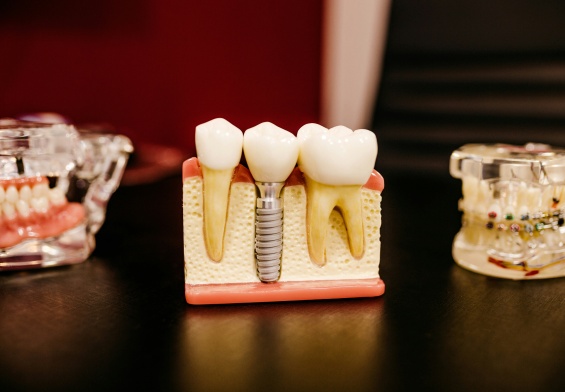Wanting a natural-looking replacement for your missing teeth is perfectly understandable. Many modern patients trust dental implants in NJ to provide those replacements, restoring function, appearance and confidence. But, there’s more to the process than most people are aware of.
If you’re considering implants for the first time, our comprehensive guide to dental implants breaks down how they work, who qualifies, and what recovery is really like.
Whether you’re exploring a dental implant procedure in NJ for a single missing tooth or a full-mouth rehabilitation, understanding what really happens can help you make an informed choice.
This guide brings together clinical insights from peer-reviewed research to explain the real-world truths behind dental implants and what every NJ patient should know.
Quick Answer: The Truth Most Patients Don’t Hear About Dental Implants
Dental implants in NJ need the same care as natural teeth and involve a healing process of three to six months. Not everyone qualifies immediately, since factors like bone density, health conditions, and habits such as smoking can affect outcomes. With proper maintenance and planning, most adults can safely receive implants that last for decades.
Why Dental Implants in NJ Have Such a High Success Rate
Peer-reviewed data show that dental implants in NJ achieve 91–98% success rates. They catch is that they need proper care and planning. Those numbers come from large-scale studies in journals like Medicina and the International Journal of Implant Dentistry. While rare, failures do happen, usually early in bone integration or during hygiene lapses.
Modern NJ implant dentists use 3D imaging and guided techniques to improve precision and predict outcomes. Long-term success depends just as much on patient behavior as on surgical skill. Consistent cleaning and professional maintenance are mandatory.
If you’re comparing implants to other restorations, see Dentures vs. Implants: Best Smile Solutions for Seniors at Home for a clear breakdown of longevity and comfort differences.
Caring for Your Implants: Why Maintenance Matters as Much as Surgery
The British Dental Journal (2024) emphasizes that implants are not maintenance-free. They’re just like real teeth. They collect plaque, and that causes problems if you’re not on top of it. Peri-implantitis, a gum infection responsible for roughly one-fifth of implant complications is one of the most common. Regular cleaning and monitoring are essential to protect bone support.
NJ dental teams often design hygiene plans that include powered brushing, interdental cleaning, and professional visits every 5–6 months. Even high-risk patients, like smokers or diabetics, can maintain excellent results with strict home care and frequent professional cleanings. For those researching dental implants NJ, the importance of proper maintenance for protecting your investment can’t be overstated.
To learn how gum health affects your results, explore Periodontal Disease and Dental Implants for prevention and care insights.
How to Keep Your Dental Implants Healthy Long-Term
| Aspect | Recommendation | Benefit |
| Home Care | Brush twice daily with a powered brush; floss or use interdental brushes | Reduces bleeding and plaque buildup |
| Professional Cleaning | Air-polishing or ultrasonic scaling every 3–6 months | Prevents peri-implantitis progression |
| Risk Assessment | Track smoking, diabetes, and hygiene compliance | Detects inflammation early |
| Recall Frequency | Every 3–12 months, adjusted by risk | Consistent follow-up halves complications |
Regular follow-ups remove buildup and allow dentists to measure gum depth, assess tissue health, and track bone levels. That proactive monitoring is why NJ patients who keep regular visits see less issues over time.
Healing and Recovery: What to Expect After Implant Surgery
Healing after implant placement takes time and patience. According to studies summarized in the British Dental Journal (2024), bone-to-implant fusion, called osseointegration, usually requires up to 6 months. It’s the most well-known and important part of implant surgery recovery
This process is sensitive to movement and stress. NJ dentists often recommend soft diets and careful brushing during recovery. Immediate loading—placing a crown the same day—may be possible in select cases. But, it’s a gamble that can raise failure risk without ideal stability. Local implant specialists across New Jersey use precise digital tools to determine when healing is complete and restoration is safe.
For a full breakdown of recovery stages and expectations, visit Are Dental Implants Right for You?.
Bone Health and Density: The Hidden Factor Behind Implant Success
Bone quality determines how securely an implant fuses. The Maxillary Sinus Lift Procedures Review (2023) explains that low bone height, especially in the upper jaw, can prevent proper anchoring. Yet, techniques such as bone grafting or sinus lifts restore bone and allow implant placement even after long-term tooth loss.
NJ implant dentists rely on cone-beam CT (CBCT) scans to check bone thickness and shape. These scans guide graft selection and reduce complications like sinus membrane perforation, which occurs in many unplanned cases without imaging. For those seeking dental implants NJ, this evaluation step confirms personalized treatment and improved long-term success.
If your dentist mentions implant bridges or grafting, you can also read What Are Implant Bridges? to understand how multi-tooth restorations work.
Options NJ Patients Have to Strengthen Bone for Implants
| Procedure | When Used | Success Factors |
| Sinus Lift | Bone height ≤10 mm in upper jaw | >4 mm residual bone; platelet-rich fibrin shortens healing |
| Bone Grafting | Inadequate width or volume | Combined grafts show 85–98% survival |
| CBCT Evaluation | Always pre-surgery | Maps anatomy and minimizes surgical risk |
Bone grafting is predictable. Most patients who start with poor density can later receive implants with outcomes equal to standard procedures. For NJ patients, that mean dental implant treatment can overcome the barrier of bone loss.
Lifestyle Choices That Can Make or Break Your Dental Implants
Lifestyle choices play a major role in implant survival. The Medicina (2022) meta-analysis found that smokers face a higher risk of implant failure and roughly significantly more bone loss than non-smokers. Smoking reduces blood flow and oxygen to healing tissue, slowing bone formation and increasing infection risk.
The International Journal of Implant Dentistry (2022) found similar concerns for uncontrolled diabetes. When blood sugar levels stay above 8% HbA1c, peri-implantitis risk can rise. But when diabetes is well managed, implant success rates reach 94–99%, nearly identical to healthy patients.
NJ dental practices coordinate with physicians to stabilize these factors before surgery. Smoking cessation programs and blood sugar monitoring improve outcomes and reduce recovery time for anyone planning dental implants in NJ. Many specialists also offer guidance on dental implants for smokers in New Jersey, helping patients quit early to boost healing and ensure long-term success.
Are Dental Implants Worth the Cost? Understanding the Long-Term Value
Dental implants cost more upfront than bridges or dentures. You’re paying more for their lifespan. With 95–98% survival rates over 10 years, they outlast most alternatives, which often need replacement within a decade. Over time, implants can prove less expensive and far more comfortable.
NJ dentists often describe implants as preventive investments. They preserve jawbone structure, prevent shifting of surrounding teeth, and cut adhesive or reline costs. Many offices also offer phased or financed treatment to make long-term solutions accessible. When comparing options, understanding the cost of dental implants in Clark, NJ helps patients plan confidently for lasting oral health and value.
When Dental Implants Fail (and How NJ Dentists Prevent It)
Despite strong success statistics, failures can happen. The Medicina (2022) review reported failure rates between 2% and 9%. They’re mostly linked to early infection, poor bone integration, or excessive mechanical stress. Late failures are commonly associated with gum inflammation or unmanaged medical risks.
Advanced NJ practices reduce these outcomes through precise imaging, computer-guided placement, and detailed follow-ups. Even if an implant fails, re-treatment is often possible after addressing underlying issues.
Who’s a Good Candidate for Dental Implants in NJ?
Not everyone can get implants right off the bat. But, most people can become candidates with the right preparation. According to the International Journal of Implant Dentistry (2022), patients once considered unsuitable—like those with mild bone loss or controlled systemic conditions—achieve similar success rates after pre-treatment.
Evaluation includes imaging, gum health assessment, and medical review. NJ dentists use this data to plan bone grafting or sinus augmentation. These preparatory steps make dental implants accessible to nearly all motivated patients across New Jersey.
How Dental Implants Feel Once They’re Fully Healed
After full integration, dental implants feel remarkably natural. Studies show that within 3–6 months, the restored tooth functions like a natural one in strength and sensation. Patients get their confidence in eating, speaking, and smiling back.
NJ implant specialists focus on prosthetic design and bite alignment to guarantee comfort. Once healed, the implant blends seamlessly, preserving facial structure and preventing the jawbone shrinkage that often follows tooth loss.
Key Takeaways for NJ Patients Considering Dental Implants
- Dental implants in NJ achieve 91–98% success with proper care and monitoring.
- Daily cleaning and professional visits prevent inflammation and long-term bone loss.
- Healing averages 3–6 months; patience ensures strong integration.
- Bone grafting and sinus lifts safely expand candidacy for many patients.
- Smoking and uncontrolled diabetes remain leading risk factors but are manageable.
- Failures are rare (2–9%) and often reversible with early detection.
- Implants last longer and protect bone better than bridges or dentures.
- With the right care, NJ patients can expect the best dental implant results in New Jersey, combining aesthetics, function, and durability.
What Every NJ Patient Should Know Before Getting Dental Implants
What no one tells you about dental implants is that their success depends as much on care and lifestyle as on the procedure itself. Research from clinical studies shows that with proper hygiene, bone support, and health management, implants are both durable and safe.
For NJ patients, partnering with an experienced implant dentist means clear communication, careful planning, and long-term peace of mind. Understanding these less-discussed details allows you to make a confident, informed decision about restoring your smile. For those researching dental implants in NJ, this transparency corroborates every patient’s expectations from start to finish.
Resources
Alshamrani AM, Mubarki M, Alsager AS, Alsharif HK, AlHumaidan SA, Al-Omar A. Maxillary Sinus Lift Procedures: An Overview of Current Techniques, Presurgical Evaluation, and Complications. Cureus. 2023;15(11):e49553. Published 2023 Nov 28. doi:10.7759/cureus.49553
Mustapha AD, Salame Z, Chrcanovic BR. Smoking and Dental Implants: A Systematic Review and Meta-Analysis. Medicina (Kaunas). 2021;58(1):39. Published 2021 Dec 27. doi:10.3390/medicina58010039
Perussolo J, Donos N. Maintenance of peri-implant health in general dental practice. Br Dent J. 2024;236(10):781-789. doi:10.1038/s41415-024-7406-8
Wagner J, Spille JH, Wiltfang J, Naujokat H. Systematic review on diabetes mellitus and dental implants: an update. Int J Implant Dent. 2022;8(1):1. Published 2022 Jan 3. doi:10.1186/s40729-021-00399-8




